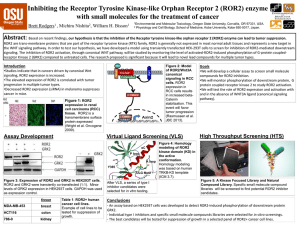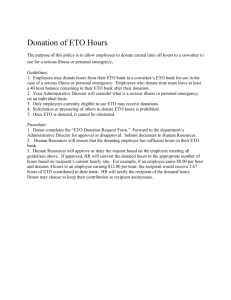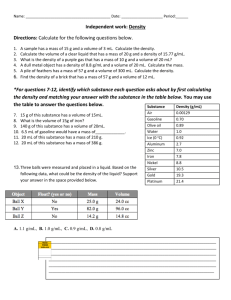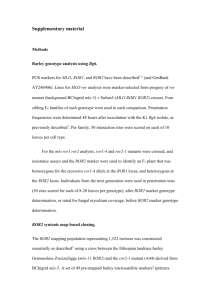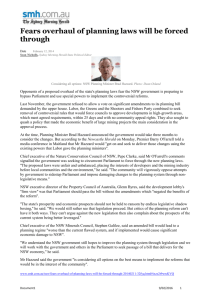Entrenched Legislation - ANU Law Students` Society
advertisement
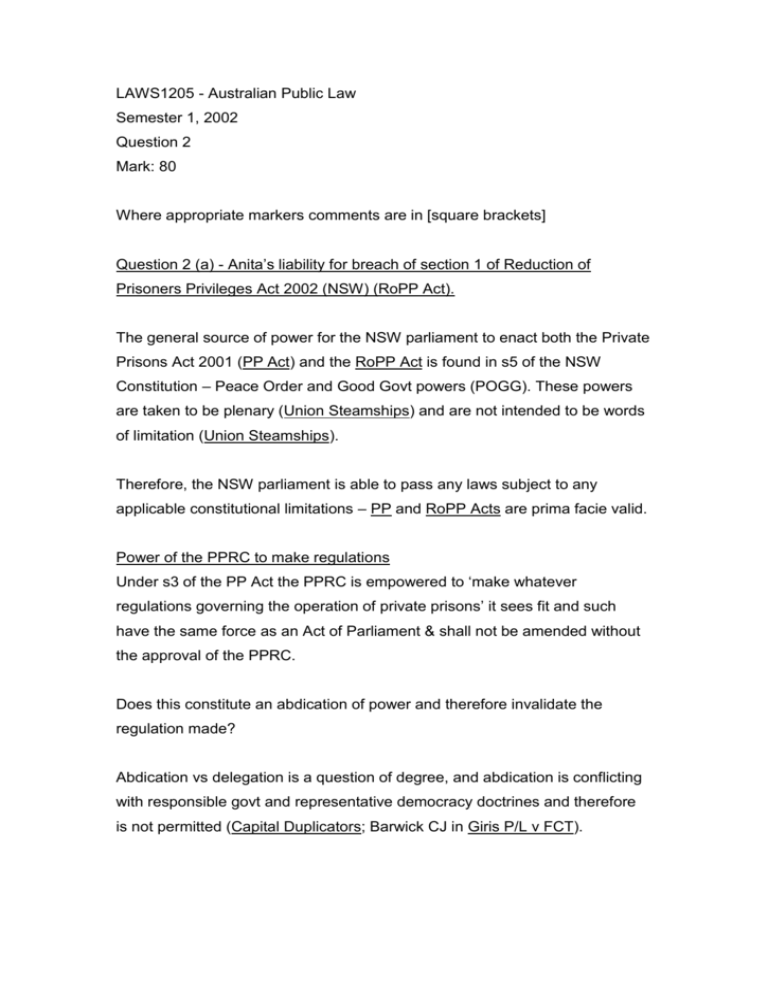
LAWS1205 - Australian Public Law Semester 1, 2002 Question 2 Mark: 80 Where appropriate markers comments are in [square brackets] Question 2 (a) - Anita’s liability for breach of section 1 of Reduction of Prisoners Privileges Act 2002 (NSW) (RoPP Act). The general source of power for the NSW parliament to enact both the Private Prisons Act 2001 (PP Act) and the RoPP Act is found in s5 of the NSW Constitution – Peace Order and Good Govt powers (POGG). These powers are taken to be plenary (Union Steamships) and are not intended to be words of limitation (Union Steamships). Therefore, the NSW parliament is able to pass any laws subject to any applicable constitutional limitations – PP and RoPP Acts are prima facie valid. Power of the PPRC to make regulations Under s3 of the PP Act the PPRC is empowered to ‘make whatever regulations governing the operation of private prisons’ it sees fit and such have the same force as an Act of Parliament & shall not be amended without the approval of the PPRC. Does this constitute an abdication of power and therefore invalidate the regulation made? Abdication vs delegation is a question of degree, and abdication is conflicting with responsible govt and representative democracy doctrines and therefore is not permitted (Capital Duplicators; Barwick CJ in Giris P/L v FCT). Factors to identify abdication The scope of the delegation in this case is restricted to private prisons in NSW and is not plenary. Since parliament has not retained the ability to approve delegated legislation and they must obtain permission of the PPRC to amend the PP Act and regulations this would identify abdication (Dean v A-G (Qld)). Another factor is that the legislation is entrenched. This is a difficult distinction to make. Abdication would result in the regulation being invalid. Entrenched Legislation Assuming the regulation is valid (delegation) – can the NSW Parliament pass the RoPP Act without the approval of the PPRC (implied amendment to regulation since the later legislation impliedly repeals the earlier to the extent of the inconsistency (McCawley v R)). Ss 3 & 4 of the PP Act appear, prima facie, to be entrenching provisions and as such the 2 stage test in Trethowan must be applied: 1. Is the RoPP Act related to the Constitution, Powers and Procedure of the legislature? 2. Does the PP Act impose a manner & form provision for passing legislation of the kind in the RoPP Act? 1. Constitution, Powers and Procedure (CPP) The RoPP does not appear to be about the CPP of the legislature. Therefore it will be valid and impliedly repeals the regulations to the extent of any inconsistencies (McCawley). 2. Manner and form (m/f) Assuming the RoPP Act is CPP, are ss3 & 4 m/f provisions? The question is whether they lay down a procedure to be followed or are they a denial of the legislative process? (West Lakes; Cth Aluminium) If they are onerous they may not be supported (West Lakes). The s3 requirement of PPRC approval is likely to be invalid (Comalco) while the s4 2/3 majority requirement is a difficult decision to make. Extra Territorial Operation (ETO) Assuming the RoPP Act is shown to be valid, does it act with ETO? State parliaments are able to legislate with ETO through the Australia Act (AA) 1986 (Cth) s2(1) but this is subject to a 4 stage test: (1) Does operation of the law, on the facts, involve ETO? In this case Anita was in Florida (USA) at the time of the offence and therefore ETO is required. (2) Did the parliament intend ETO? Statutory presumption that the parliament is limited to its own territory (Morgan v White) but it is rebuttable via ordinary statutory interpretation. The RoPP Act identifies “any person” is liable and therefore parliamentary intention is possible. (3) Power to confer ETO? S 2(1) of AA. Nexus test – connection between something and the jurisdiction (Broken Hill South; Pearce v Florenca). Here the connection is between the NSW prisoner and Anita in Florida. Likely to be sufficient (may be general or remote – Union Steamships). (4) Conflict with laws of the other jurisdiction? Not known on the facts. Likely to have ETO powers. For Antia’s defence she will need to argue: RoPP is invalid because it does not comply with m/f provisions; ETO is not available It has been shown above that A is unlikely to be able to show either of thee and is likely to be liable for breach of RoPP Act s1. [Freedom of political communication issues?] Question 2(b) – Henry’s liability See the above discussion of A’s liability for discussion of: The validity of the RoPP Act If it has ETO (here it is Vic, not USA, but the same arguments apply same nexus and likely to have ETO). One extra defence is available to H then was available to A: “Shield of the crown” The Crown has a presumptive immunity from burdensome legislation (Bropho v WA) and it will only be bound if it is expressly provided or is by necessary implication (Bradken; Essendon Corp). Two aspects must be show to have Crown immunity apply to H: That H is within ‘the Crown’; That the Crown in right of Victoria is immune from NSW legislation. Is H ‘the Crown’? The question is whether parliament intended the Victorian Crimes Commission to be the Crown, look at the Crimes Commission Act 1995 (Vic) and not the RoPP Act (Townsville Hospital). Factors: (i) Statutory presumption – presumed [statutory authority?] not to be part of the R unless parliament has expressly declared it is (Townsville Hospital) – look at the CC Act (not provided). (ii) Terms of the statute – not provided. (iii) Nature of the function – is it a typical government function (Townsville Hospital). In this case it is likely to be within traditional govt function (crime investigation) [explain]. (iv) Degree of independence – since the VCC is independent of the Victorian Minister for Police this identifies it is likely not to be the crown (Bradken). (v) Nature of the immunity being claimed – is a relatively harmless breach and may therefore have immunity. These factors must be balanced to determine if the VCC is within ‘the Crown’. There is insufficient evidence to prove it is and it seems likely (due to independence) not to be. Assuming it is… The Crown cannot authorise an employee to breach the criminal law (A v Hayden) and therefore H is likely to be liable anyway. But, assume H is ‘the Crown’… Does the R in right of Victoria enjoy immunity from NSW legislation? Will only be binding if is expressly provided or by necessary implication (Bradken) and in this case the Victorian Crown is likely [Why? Explain] to enjoy immunity. H must rely on: Invalidity of the RoPP Act (m/f not satisfied); No ETO available (fails nexus); R immunity: H must be within ‘the Crown’ and the Victorian Crown must enjoy immunity from the RoPP Act. Likely to be held liable since H is unlikely to be covered by the Crown.
